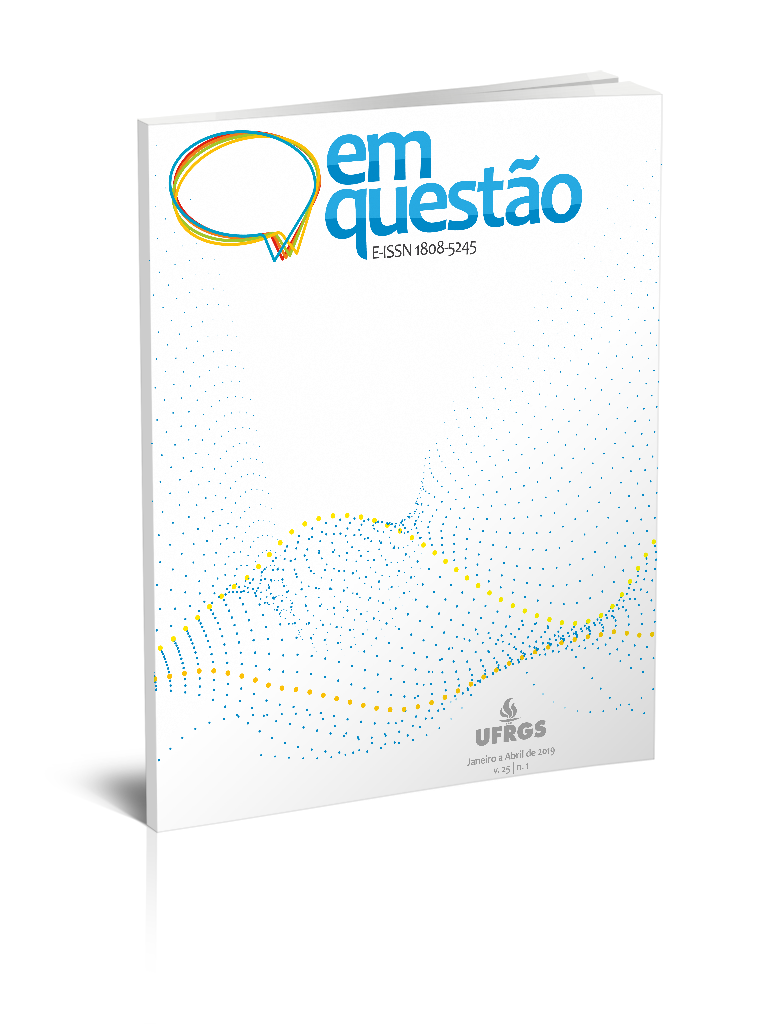Production, Search and Information Sharing in the Context of mobile commerce
DOI:
https://doi.org/10.19132/1808-5245251.414-441Keywords:
Social commerce. Mobile commerce. Information practices. Mobile applications.Abstract
It approaches the concept of consumption. It analyzes the
development of the consumption society and the mass markets. It identifies
characteristics of the consumer’s behavior study. It approaches the changes in
the e-commerce caused by the social media and applications for mobile devices.
It displays the characteristics of social commerce and m-commerce. It describes
the production, search and information sharing practices in the context of mcommerce.
It evidences the informational practices from the functionalities
present in the Airbnb, Amazon, iFood and Spotify applications. It verifies that,
in the scope of m-commerce, the informational practices have suffered changes
that result in the relations among informational consumption, sociability and
goods and services consumption.
Downloads
References
AMAZON. Amazon.com.br. São Paulo: Amazon, c2017.
BALDISSERA, Rudimar. Comunicação organizacional na perspectiva da complexidade. Organicom: Revista Brasileira de Comunicação Organizacional e Relações Públicas, São Paulo, v. 6, n. 10/11, p. 115-120, 2009.
BARBOSA, Lívia; CAMPBELL, Colin. Cultura, consumo e identidade. Rio de Janeiro: FGV Editora, 2006.
BAUDRILLARD, Jean. A sociedade de consumo. Lisboa: Edições 70, 1991.
BLACKWELL, Roger; MINIARD, Paul; ENGEL, James. Comportamento do consumidor. São Paulo: Pioneira Thomson Learning, 2005.
BLOCH, Peter H.; SHERRELL, Daniel L.; RIDGWAY, Nancy M. Consumer search: an extended framework. Journal of Consumer Research, Chicago, v. 13, n. 1, p. 119-126, June 1986.
CANCLINI, Néstor García. Consumidores e cidadãos: conflitos multiculturais da globalização. 4. ed. Rio de Janeiro: Editora UFRJ, 1995.
CHAN, Felix T. S.; CHONG, Alain Yee-Loong. Analysis of the determinants of consumers’ m-commerce usage activities. Online Information Review, Bradford, v. 37, n. 3, p. 443-461, 2013.
CONSTANTINIDES, Efthymios; FOUNTAIN, Stefan J. Web 2.0: conceptual foundations and marketing issues. Journal of Direct, Data and Digital Marketing Practice, Basingstoke, v. 9, n. 3, p. 231-244, 2008.
DUAN, Wenjing; GU, Bin; WHINSTON, Andrew B. The dynamics of online word-of-mouth and products sales: an empirical investigation of the movie industry. Journal of Retailing, New York, v. 84, n. 2, p. 233-242, June 2008.
HENAO, Oscar; CÓRDOBA López, José Fernando. Comportamiento del consumidor, uma mirada sociológica. Entramado, Santiago de Cali, v. 3, n. 2, p. 18-29, jul./dic. 2007.
HYRYNSALMI, Sami et al. Busting myths of electronic word of mouth: the relationship between customer ratings and the sales of mobile applications. Journal of Theoretical and Applied Electronic Commerce Research, Talca, v. 10, n. 2, p. 1-18, May 2015.
ISLAM, Md. Rashedul; ISLAM, Md. Rofiqul; MAZUNDER, Tahidul Arafhim. Mobile application and its global impact. International Journal of Engineering & Technology, Ras al-Khaimah, v. 10, n. 6, p. 72-78, Dec. 2010.
JESUS, Deise Lourenço de; CUNHA, Murilo Bastos da. Produtos e serviços da web 2.0 no setor de referência das bibliotecas. Perspectivas em Ciência da Informação, Belo Horizonte, v. 17, n. 1, p. 110-133, jan./mar. 2012.
LIPOVETSKY, Gilles. A felicidade paradoxal: ensaio sobre a sociedade do hiperconsumo. Lisboa: Edições 70, 2007.
MILLS, Leila A.; KNEZEK, Gerald; KHADDAGE, Ferial. Information seeking, information sharing, and going mobile: three bridges to informal learning. Computers in Human Behavior, Amsterdam, v. 32, p. 324-334, Mar. 2014.
MOON, Byeong-Joon. Consumer adoption of the internet as an information search and product purchase channel: some research hypotheses. International Journal Internet Marketing and Advertising, Cidade, v. 1, n. 1, p. 104-118, Jan. 2004.
NEUBERT, Patrícia da Silva; RODRIGUES, Rosângela Schwarz. Pesquisa bibliográfica e web 2.0: percepção de estudantes de pós-graduação em Ciência da Informação. Informação & Sociedade: estudos, João Pessoa, v. 22, n. 3, p. 143-154, set./dez. 2012.
RIFKIN, Jeremy. A era do acesso: a transição de mercados convencionais para networks e o nascimento de uma nova economia. São Paulo: Makron Books, 2001.
SCHULTZ, Don E.; TANNENBAUM, Stanley I.; LAUTERBORN, Robert F. The new marketing paradigm: integrated marketing communications. Lincolnwood: NTC Business Books, 1993.
SOLOMON, Michel R. O comportamento do consumidor: comprando, possuindo e sendo. 9. ed. Porto Alegre: Bookman, 2011.
STERNE, Jim. Métricas em mídias sociais: como medir e otimizar os seus investimentos em marketing. São Paulo: Nobel, 2011.
TANG, Qian; GU, Bin; WHINSTON, Andrew B. Content contribution for revenue sharing and reputation in social media: a dynamic structural model. Journal of Management Information Systems, Abingdon, v. 29, n. 2, p. 41-75, 2012.
TSAO, Wen-Yu. The fitness of product information: evidence from online recommendations. International Journal of Information Management, Amsterdam, v. 33, n. 1, p. 1-9, Feb. 2013.
ZHANG, Kem Z. K.; BENYOUCEF, Morad. Consumer behavior in social commerce: a literature review. Decision Support Systems, Connecticut, v. 86, p. 95-108, June 2016.
Downloads
Published
How to Cite
Issue
Section
License
Copyright (c) 2018 Em Questão

This work is licensed under a Creative Commons Attribution 4.0 International License.
Authors who publish with this journal agree to the following terms:
Authors will keep their copyright and grant the journal with the right of first publication, the work licensed under License Creative Commons Attribution (CC BY 4.0), which allows for the sharing of work and the recognition of authorship.
Authors can take on additional contracts separately for non-exclusive distribution of the version of the work published in this journal, such as publishing in an institutional repository, acknowledging its initial publication in this journal.
The articles are open access and free. In accordance with the license, you must give appropriate credit, provide a link to the license, and indicate if changes were made. You may not apply legal terms or technological measures that legally restrict others from doing anything the license permits.













